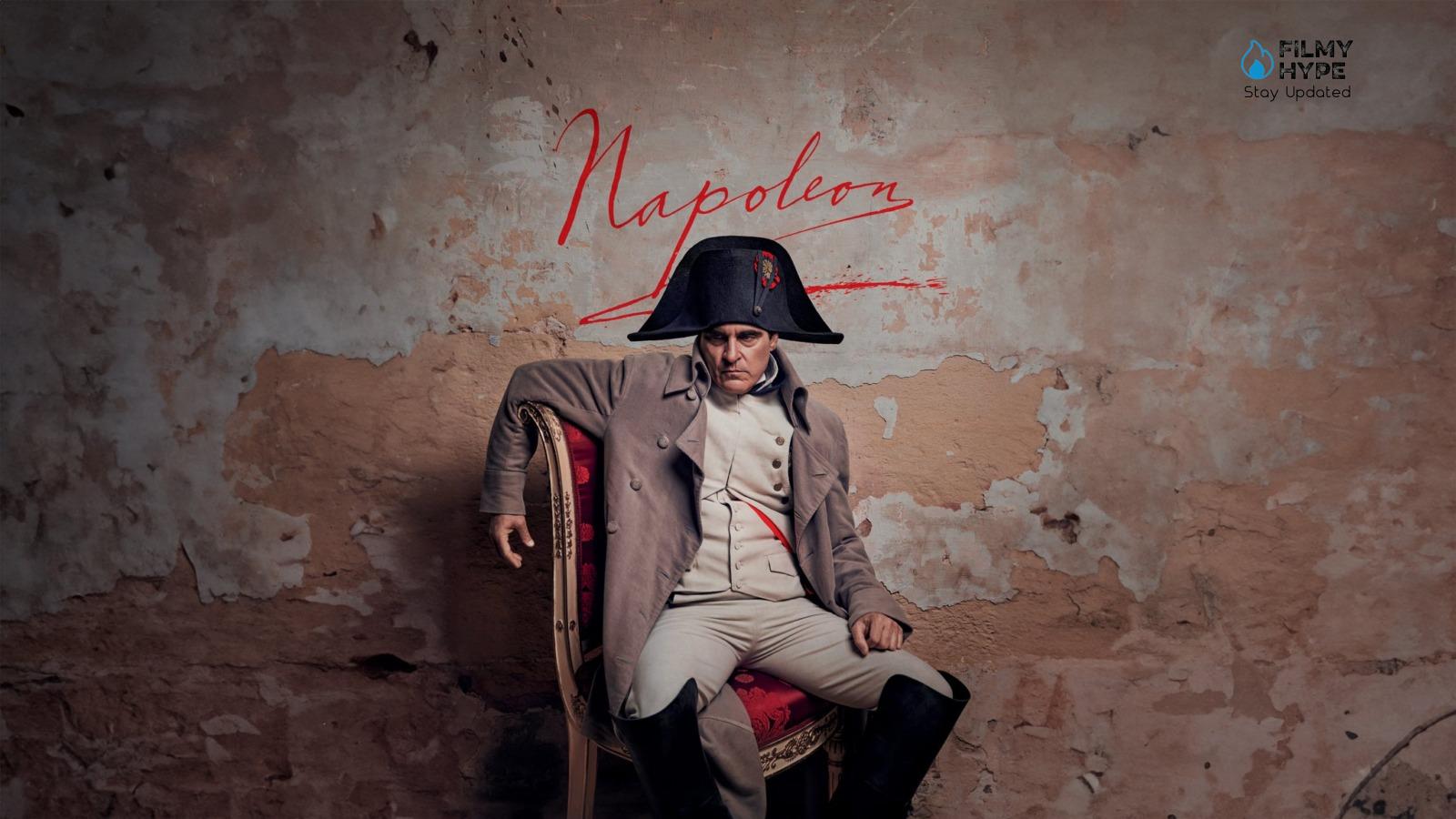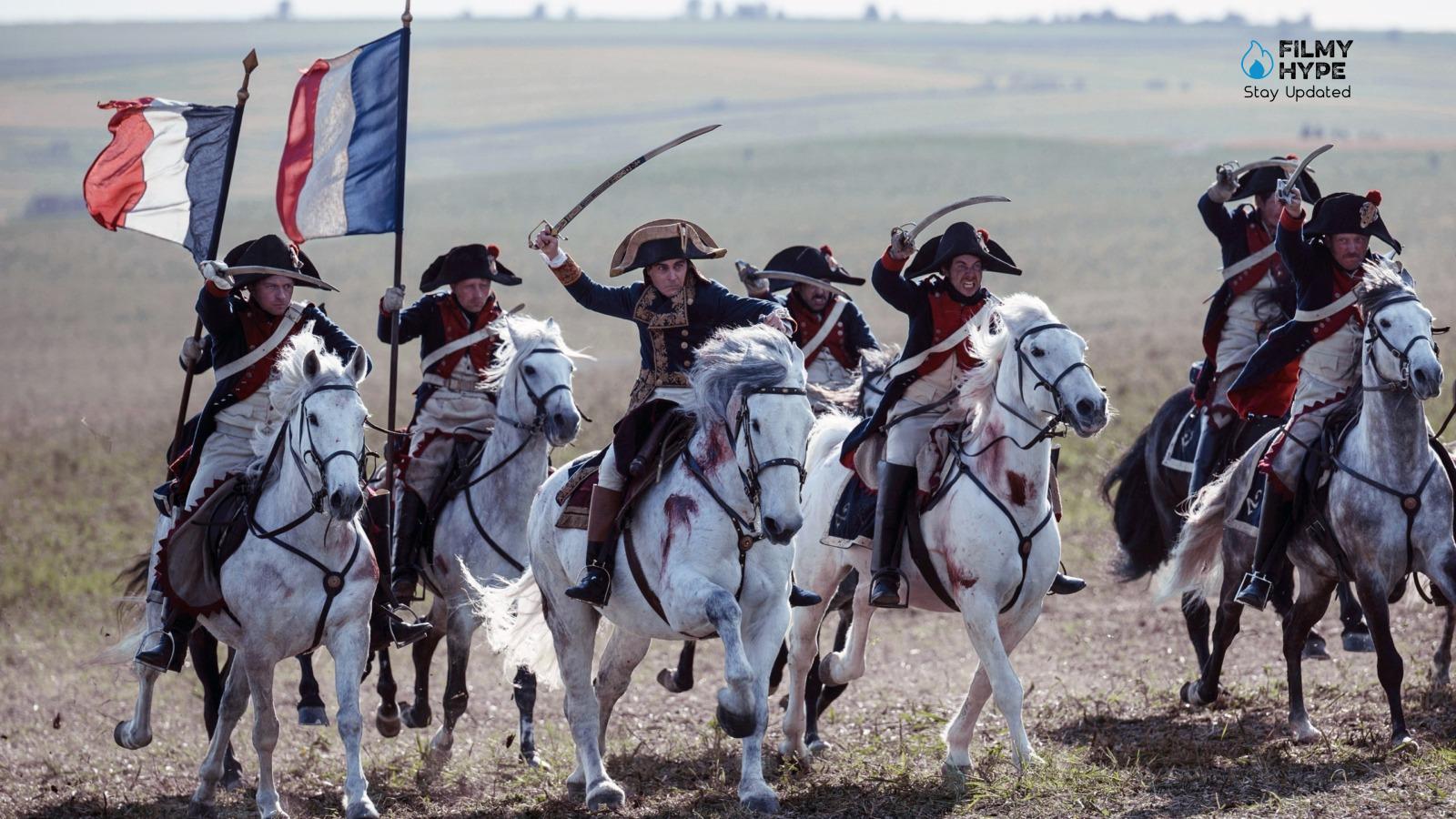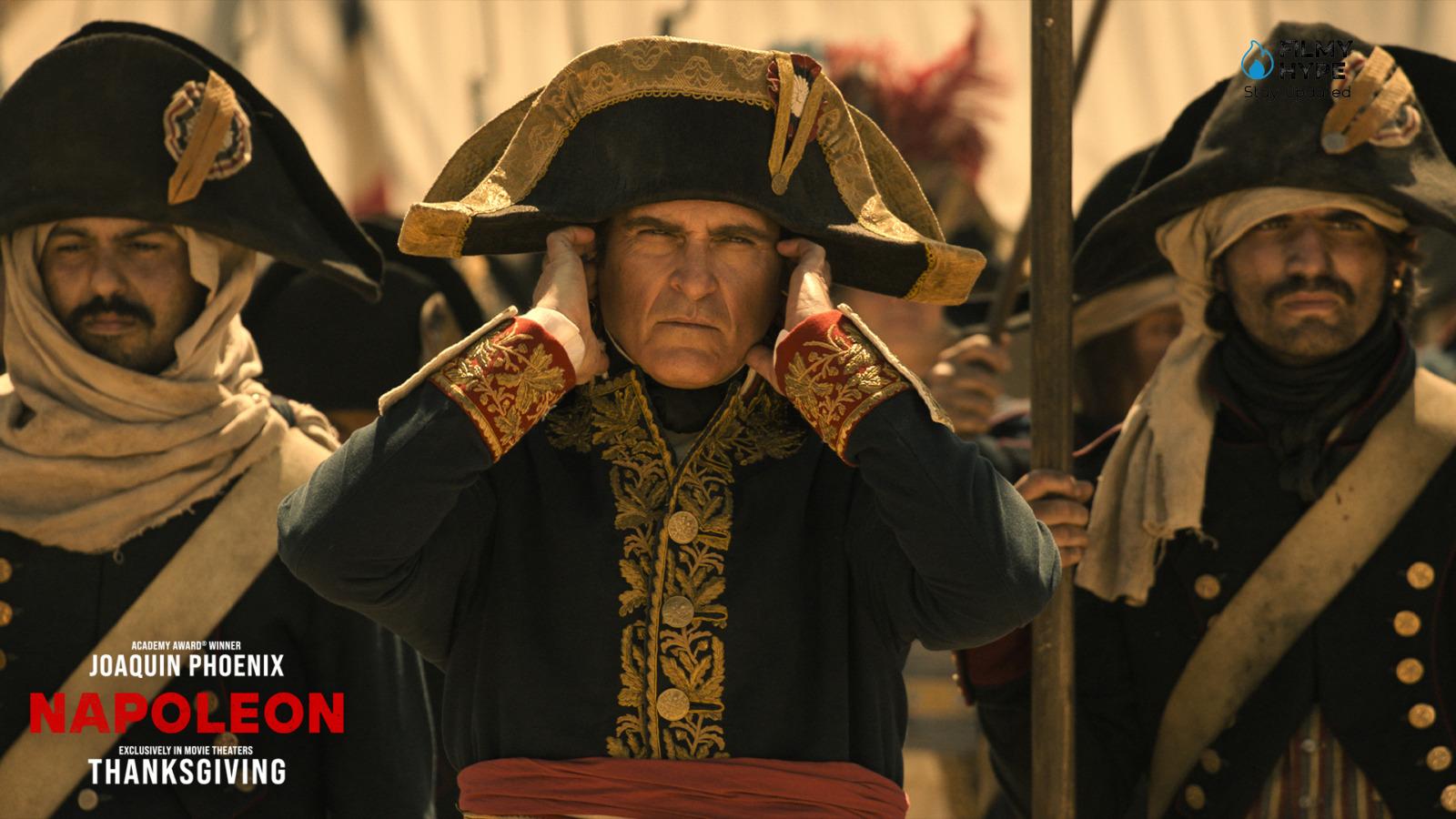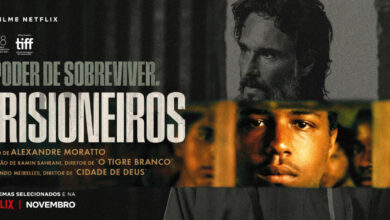Napoleon Movie Review: Ridley Scott Returns To The Theater More Powerful And Critical Than Ever
Cast: Joaquin Phoenix, Vanessa Kirby, Tahar Rahim, Ben Miles, Ludivine Sagnier, Matthew Needham, Youssef Kerkour, Phil Cornwell, Edouard Philipponnat, Ian McNeice, Paul Rhys, John Hollingworth, Gavin Spokes, Mark Bonnar
Director: Ridley Scott
Where We Watched: In Theaters
Filmyhype.com Ratings: 3.5/5 (three and a half stars)
On December 2, 1804, Napoleon Bonaparte was crowned the new emperor of France. Just as happened in reality, in Ridley Scott‘s film dedicated to him, Napoleon, he snatches the crown from the Pope’s hands to crown himself. Napoleon thus wanted to demonstrate that he was becoming emperor based on his merits and by the will of his people and not by religious consecration or divine concession. This is a gesture that gives further proof of the idea he had of himself, supported however by unequivocal military results. Napoleon was obsessed with greatness, with his cult, but as often happens, it was these obsessions that led to his ruin. Finding yourself face to face with a character like Napoleon Bonaparte is no small feat, considering the mass of stories, details, and legends regarding his life, and the obvious difficulty of summarizing or concentrating them convincingly, in the structural and figurative immediacy typical of cinematographic films.

The director therefore chooses to adopt an approach that mixes spectacular moments from a costume blockbuster with a very particular reading of the intimate dimension, which significantly transforms and humanizes a protagonist with an unattainable aura. It is in the conceptual deconstruction that one of the many creative quirks of Ridley Scott is nestled, capable of continually weighing and destabilizing the gaze of the audience in the theater, subjecting it to moments that oscillate between the figurative intensity of the images, the unscrupulous violence on the battlefields and a completely human demystification capable of realigning the legend with something else (we remind you that following the cinema release Napoleon will also arrive on Apple TV+ with a much more extensive version).
Napoleon Movie Review: The Story Plot
Scott then retraces the entire life of the famous emperor, from the revolution of 1789, during which a little more than twenty-year-old Napoleon (played by Joaquin Phoenix) witnessed the fall of the monarchy, up to his exile on the island of St. Helena, in 1815, where he remained until he died in 1821. Between these two peaks, a story of passions and ambitions comes to life, from the troubled love for Josephine (played by Vanessa Kirby) to the military conquests that led him to become emperor. Wars, strategies, and the obsession for an heir then characterize the existence of one of the most influential historical figures of humanity, whose ambition has had few equals.
There was therefore a lot of anticipation for this new epic historical blockbuster signed by a director who, at 86 years old, is still among the brightest working. A director who, with films like The Duelists, Gladiator, The Crusades, or the recent The Last Duel, has amply demonstrated his ability to master this genre like few others and who has now found Joaquin Phoenix, entrusting him with one of those larger-than-life roles that he rarely finds himself able to take on. But telling such a character in a film (even if it is two hours and forty minutes long) is a feat that should not be underestimated, and which Scott only manages to partially overcome.

The story at the center of Napoleon (played by Joaquin Phoenix) is extremely classic in its premises, as well as full of expectations coming both from all the historical and scholastic material deriving from such a character and the various legends, stories, and tales fueled by the dimension fictional, literary, theatrical and cinematographic. Ridley Scott, like many others, chooses to tell the story of Napoleon Bonaparte and that set of choices, ideas, visions, and fleeting moments that he seized to reach the top of French power, casting a shadow still studied and admired by some today. The film develops starting from the French Revolution, a key moment in world history, then moving on to the siege of Toulon and taking the path of the military and political career of a man remembered for some of the most memorable victories on the battlefield ever (like that of Austerlitz, for example).
In his incessant search for fulfillment, Scott’s Napoleon, however, alternates enormous personal ambition with the tormented relationship with Josephine of Beauharnais (originally known as Marie-Josèphe-Rose Tascher de La Pagerie and played by Vanessa Kirby), in which toxic love and a certain degree of detached and morbid possession reign supreme, trying to investigate the most personal reasons of their private life. The rise and fall of a myth, therefore, are the main glue of a plot that plays with images, implanting on the big screen a purely cinematic experience in which the direction explodes together with the power of imagery smoothed by the touch of the same director, and from the soundtrack by Martin Phipps, in a continuous digression from one key moment to another, trying to deconstruct and highlight the mythical material known throughout the world.
Napoleon Movie Review and Analysis
Napoleon aims to be the study of the psychology of a complex man such as Napoleon. The director chooses to highlight this personality of his, in which genius, madness but also many insecurities coexist, through his relationship with both military enterprises and the private sphere. From here therefore emerges a portrait of Napoleon as a great strategist blinded by his egotism, as well as limited by his obsessions, primarily that of the cult of himself. By exasperating his vices, his tics, and the most brutal aspects of him, Scott therefore gives an almost satirical portrait (we must not forget that Scott is British) of the famous French general. A desire for satire that seems – at least in the first part – to recall the excesses of House of Gucci, here fortunately not achieved in a film to which they would have adapted very little.
However, a severe gaze remains on Napoleon, guilty of having dared too much, of having sacrificed what could have saved him. However, as fascinating as the director’s progressively darker portrayal of it is, the film instead seems rather uncertain about the direction to take, at least in its first half. Throughout it, we witness a rapid flow of historical events of which, however, there is a certain superficiality in their treatment, as well as an editing that sometimes jumps too abruptly from one to the other, resulting in a story that is too frayed. Scott revealed the existence of a 4-hour director’s cut of the film, in which it is possible at this point to hypothesize that this first part finds redemption, but certainly, the version of it intended for the theater may generate more than a few doubts. Similar sensations are felt in the story of the relationship between Napoleon and his beloved Giuseppina.
The importance of her in his public and private life (as well as in the film itself) is immediately made clear, but even in this case their exchanges are often sacrificed, just as Kirby appears sacrificed in the role of a woman who, made except for some fleeting but strong demonstrations of power and modernity, it fails to express its best. A shame, considering that precisely by delving into the turbulent relationship between the two the film could not only identify enough to tell the story of Napoleon that seems to interest the director, but also its own strong artistic identity. From the moment of the coronation – which arrives exactly halfway through the feature film – the film begins to acquire that long-awaited gravity in tone and atmosphere, underlined by a soundtrack that finally becomes more incisive, thus accompanying us towards the decadence as emperor and as Napoleon‘s man.
It is during this second part that we witness the best and most exciting moments of the film, the emergence of that sense of the epic which then characterizes a couple of particularly engaging and exciting war sequences, which Scott composes with that great mastery of the camera grip and staging that distinguishes it. The second hour and a quarter of the film is therefore what one might expect from a large-scale work of this type, with this type of protagonist. Napoleon himself becomes at this point an increasingly dark figure, fascinating in his tragedy. And it is from here that his personality emerges most forcefully, also thanks to Joaquin Phoenix, from whose spirited gaze all the madness but also the romanticism of Napoleon is released. The actor demonstrates once again that he is gifted with an impressive capacity for empathy, giving life here to a performance capable of overshadowing (sometimes too much) everything else.

Around him, Scott builds a truly impressive film – thanks also to the sets by Arthur Max and the costumes by David Crossman and Janty Yates – which offers a taste for the image which, although partially missing in the first part, presents itself with more in the second strength by seducing the viewer’s eye. In any case, the feeling remains that in wanting to talk about both Napoleon the military strategist, and the stormy lover Napoleon, one does not obtain a particular key to understanding either one or the other. It was unthinkable not to deal with both these aspects – unless one wanted to carry out a much more particular narrative operation – but not always the screenplay by David Scarpa (All the Money in the World), to which the film’s major limitations are due, manages to balance them, thus rendering a psychological portrait that is not particularly successful. However, when it manages to distance itself just enough from the political context, almost bringing us into the subjectivity of the protagonist and focusing solely on Napoleon‘s actions both on the battlefield and under the sheets, the film and its protagonist demonstrate their originality and size.
One of the great merits of Napoleon, however, remains firmly anchored to the formal dimension that shapes it from beginning to end. Ridley Scott‘s direction, in outlining the various events, becomes pictorial, refined, and spectacular on several occasions, dragging the spectators into the cinema directly into the action in progress. The attention to the smallest details of some moments moves hand in hand not only with the composition of some shots but also with the care in terms of scenography (curated by Arthur Max), soundtrack, costumes (David Crossman and Janty Yates), and photography (curated by Dariusz Wolski). The set of formal elements that make up Napoleon is enveloping (albeit with some slip-ups in terms of CGI), proposing a path that is both linear and at the same time curiously broken down, in its attempt to include, perhaps, as many details as possible in the narrative.
Thus, Ridley Scott throws on to us all the weight of a biographical story that has been nourished for centuries by the scholastic and legendary world dimension, trying to dust off its communicative skills in favor of much more cinematic and critical work. He is a different Napoleon from the one you would expect to find at the cinema. A brilliant and enterprising leader, yes, but also an imperfect, cruel, terrible man and addicted to the pride that generated his historical ruin. From a subjective and internal story to history (even of epistolary construction), Napoleon has its nerve center in the relationship between his two emperors. Inextricably linked to each other to the point that the same fate presents itself first to her and then to him, in the form of that exile desired by the society in which they lived.

In returning to his more Hitchcockian aspect, Scott plays with on-screen and off-screen but ends up mortifying the character of Giuseppina, framed only as a miserable martyr (therefore not even a possible object of any pity) and indicated as a strong part of this I play for dominance with her husband for reasons that we are not allowed to see. We are always on Napoleon‘s side, even when we read her words. Her figure changes before our eyes to the extent that the eyes of the world change towards the emperor, caged in this morbid Freudian complex towards the women in her life: France, her mother, and her. Phoenix’s Napoleon is a rough little man, who makes faces, is poorly gifted, runs away from bureaucrats, falls asleep when they talk to him about politics, snorts, gets annoyed, and stomps his feet. The great interpreter folds in on himself, searching in the depths of his most childish side for a way to stage a new Caesar which is a parody of the greatness of his idols and perhaps also a parody of his real counterpart.
He never admits a mistake, he only aspires to perfection and boasts of being destined for unparalleled greatness, but above all, he cares about being the hero of the people. Yet we never see him despair maturely and consciously, as if he couldn’t even live up to such complexity. His commitment lies in winning a childish macho contest when what excites him is submission. Napoleon is thus included in the list of films that have dealt with the theme of superhumanism, tracing profiles of dictators in such a way as to highlight their danger (the dead they left behind) through ridicule, deconstruction, the destruction of the myth through the grotesque, the exasperated. A delicate choice of tone that is sometimes not centered.
Napoleon Movie Review: The Last Words
Ridley Scott’s Napoleon is certainly a very particular and unexpected film in some of its formal and narrative elements. Starting from the story we all know, the director marks the path of a true historical myth, accompanying its existence on the big screen with some spectacular and magnificent moments, alternating them with moments that shape the imagination of Napoleon Bonaparte in favor of a figure not too far from all of us. Such an approach is certainly interesting even if not too coherent in its entirety. Ridley Scott presents us with a crazy and egotistical Napoleon, taking his worst sides to the extreme and narrating them to us both on the battlefields and in his private rooms. The film offers no other interpretations of the character other than his crazy ambitious nature, depicted here with a severe look towards him. However, the shortcomings of the writing are compensated by excellent performances, impressive staging, and the direction of a master of cinema.







